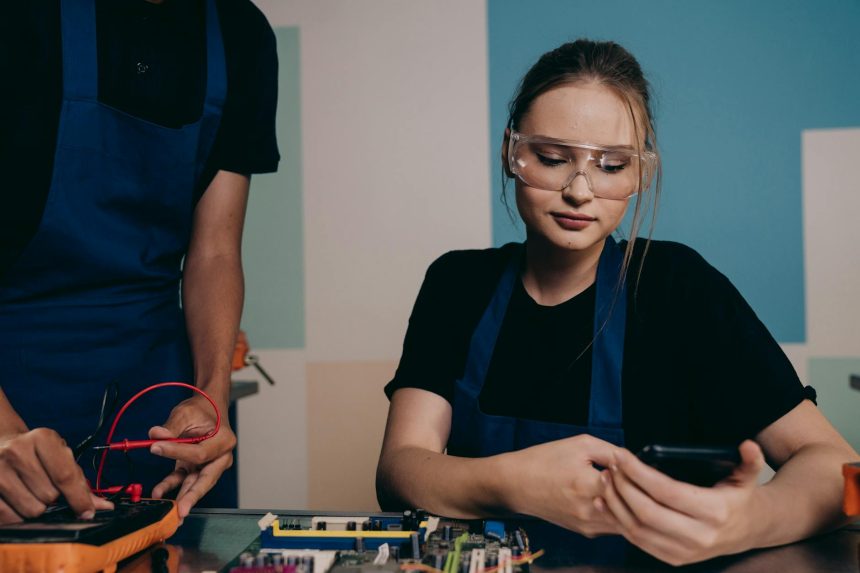vr-training-platform
VR Training Platform: 7 Ways to Revolutionize Apprentice Skills
The global demand for skilled trades is soaring, yet traditional training methods often struggle to keep pace with evolving industry needs and safety standards. Apprentices face challenges ranging from limited access to expensive equipment to the inherent risks of hands-on learning in real-world scenarios. But what if there was a way to provide unlimited, safe, and highly effective practical experience, all before stepping onto a job site? Enter the groundbreaking potential of a VR training platform, poised to fundamentally transform how the next generation masters critical trade skills.
Unlocking Potential with a Cutting-Edge VR Training Platform
Virtual reality isn’t just for gaming anymore; it’s a powerful tool for education, especially in vocational fields. By immersing learners in realistic, simulated environments, a robust VR training platform offers unparalleled opportunities for skill development without the usual constraints of time, cost, or physical risk. This innovative approach is about more than just technology; it’s about creating a smarter, safer, and more accessible pathway to expertise for apprentices across various trades.
Why Traditional Trade Skill Training Needs Innovation
For decades, apprentice training has relied heavily on classroom theory and limited practical sessions. While valuable, these methods often present significant hurdles:
- High Costs: Equipment, materials, and facility maintenance are expensive, limiting access.
- Safety Risks: Learning complex, potentially dangerous tasks like welding or electrical work carries inherent risks in real environments.
- Scalability Issues: One-on-one instruction and limited physical space restrict the number of apprentices that can be trained simultaneously.
- Inconsistent Practice: Opportunities for repetitive, targeted practice can be scarce, hindering mastery.
These challenges underscore the urgent need for a more adaptable and efficient solution to prepare apprentices for the demands of modern industry.
The Power of Immersive Learning for Apprentices
Immersive virtual reality learning addresses these issues head-on, offering a dynamic environment where mistakes are learning opportunities, not costly errors. Apprentices can repeat tasks as many times as needed, building muscle memory and confidence. This active engagement significantly boosts retention and understanding, making the learning process both more effective and enjoyable.
Key Features of a Next-Gen VR Training Platform
What makes an advanced virtual reality training system so effective? It’s the sophisticated blend of realistic simulation, data-driven feedback, and adaptable content. These platforms are designed not just to show, but to teach and assess, ensuring apprentices gain genuine competency.
- Realistic Simulations: Experience true-to-life scenarios, from complex wiring to pipe fitting, with accurate physics and feedback.
- Interactive Tools & Equipment: Virtually handle and operate digital replicas of industry-standard tools, gaining familiarity without wear and tear.
- Immediate Performance Feedback: Receive instant analysis on technique, efficiency, and safety compliance.
- Customizable Training Modules: Tailor lessons to specific trade requirements, individual learning paces, or skill gaps.
- Safety Protocol Reinforcement: Practice hazardous procedures in a zero-risk environment, ingraining correct safety habits.
- Cost-Efficiency: Reduce material waste and equipment depreciation associated with physical training.
- Accessibility: Overcome geographical barriers, allowing apprentices to train from virtually anywhere.
Real-World Scenarios in Virtual Environments
Imagine an aspiring electrician troubleshooting a complex circuit board, or a future plumber practicing intricate pipe installations, all within a safe, virtual workshop. A sophisticated VR training platform delivers exactly this, allowing apprentices to engage with diverse scenarios that mirror actual job site conditions. This practical training exposure is invaluable, preparing them for the unexpected challenges of their chosen trade with confidence and competence.
Measuring Progress and Skill Mastery
One of the most compelling aspects of modern VR training is its ability to track and analyze performance. These platforms often incorporate analytics that monitor an apprentice’s movements, decision-making, and task completion times. This data provides instructors with objective insights into an individual’s progress, highlighting areas of strength and identifying where further practice is needed, ensuring a truly personalized learning journey. For more insights into the broader impact of VR in training, explore this Forbes article on its transformative power.
Implementing VR Training: What to Consider
Adopting a virtual reality training solution requires thoughtful planning. Organizations should consider the specific trade skills they aim to teach, the technical infrastructure required, and how the VR experience will integrate with existing curriculum. Selecting a platform that offers robust content, intuitive user interfaces, and scalable solutions is paramount for long-term success. Understanding the future of immersive technologies in the workplace can also provide valuable context, as highlighted by Deloitte’s insights on AR/VR.
The Future of Skill Development with VR Training Platforms
The trajectory of skill development is undeniably shifting towards more interactive and immersive methods. A VR training platform represents a significant leap forward, offering a scalable, efficient, and highly engaging solution for preparing the workforce of tomorrow. As the technology continues to evolve, we can expect even more sophisticated simulations, haptic feedback, and collaborative virtual environments, further blurring the lines between virtual practice and real-world expertise.
The integration of a cutting-edge VR training platform is not merely an upgrade; it’s a revolution in how apprentices acquire and master critical trade skills. By providing a safe, repeatable, and deeply engaging learning environment, these platforms are empowering individuals and strengthening industries, ensuring a highly skilled workforce ready for the challenges of the future. Ready to explore how immersive VR can elevate your organization’s training initiatives? Contact us today to learn more about next-generation skill development solutions.
Apprentice wearing VR headset performing virtual trade skill training
Featured image provided by Pexels — photo by Mikhail Nilov








